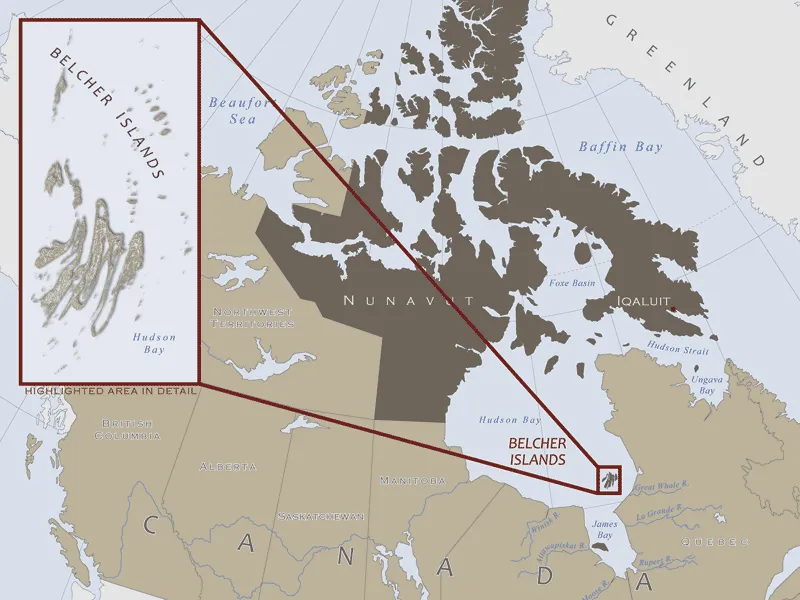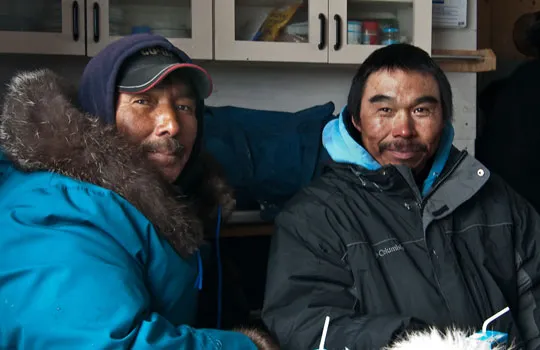Sanikiluaq Sea Ice Project
Project Overview
The information in this project site includes data from 1997 - 2009
Overview
Sanikiluaq is located on the Belcher Islands in southeastern Hudson Bay. Residents rely primarily on subsistence hunting for food, clothing, and other necessary supplies. Hunters draw on traditional climate knowledge to find animals and navigate around the islands. However, conditions in Hudson Bay have become less stable over the past few decades. Sea ice conditions are not as predictable, water currents no longer reliable, and even the quality and condition of the animals has deteriorated at times. To document these environmental changes, the Sanikiluaq Environmental Committee began conducting surveys and gathering observations.
The Sanikiluaq Sea Ice Project is one of the resulting projects, for which three hunters produce information and maps about changing conditions around the islands. This collaboration is representative of the types of communities and projects ELOKA serves. They include international projects, projects with diverse data and data needs, and data with varying accessibility. These projects are similar in that they all involve working with Arctic communities and residents in order to collect local observations and knowledge (community-based monitoring). The projects differ in the regions and cultures they represent, the data with which they are working, and their interests, needs, and goals for their data.
History of Sanikluaq
As the southernmost community in Canada's Nunavut Territory, Sanikiluaq is located in Hudson Bay, on the north end of Flaherty Island, which is part of the Belcher Island chain. Sanikiluaq was incorporated as a Hamlet in 1976 to serve as an administrative center for the Inuit people living in the Belcher Islands, and it is currently home to about 800 people.
Like many Arctic communities, there is no agriculture or farming, so Sanikiluaq residents rely on subsistence hunting. Following a long tradition in Inuit society, hunters provide food for their families and for the community. The Belcher Islands are home to a variety of wildlife that provide food, clothing, and other necessities for the residents of Sanikiluaq. The many low-lying islands and islets in the Belcher Island archipelago provide nesting grounds for eider ducks and other Arctic seabirds. Beluga whales, walrus, ringed seals, harbor seals, and Arctic char inhabit the cold waters between and surrounding the islands.
Environmental Monitoring
Within the past thirty-five years, Inuit hunters in Sanikiluaq have observed major changes in the regional sea ice environment. The Belcher Islands are located in southern Hudson Bay, near the mouth of James Bay. In the 1970s, the government of Québec began installing a series of hydroelectric dams on rivers in the James Bay watershed. Subsequent changes in water flow affected aquatic ecology, currents, and sea ice not only in James Bay, but also further north in Hudson Bay.
To understand how environmental changes might affect Sanikiluaq, the Hamlet formed a council sub-committee to address the community's concerns. In the early 1990s, the Sanikiluaq Environment Committee conducted a three-year survey to record what Inuit and other Aboriginal hunters and elders know about Hudson Bay, and what changes they were observing. Their observations were published in Voices from the Bay: Traditional Ecological Knowledge of Inuit and Cree in the Hudson Bay Bioregion.
Ten years later, in 2003, the Government of Nunavut, Nunavut Tunngavik Incorporated, and the Municipality of Sanikiluaq formed a Nunavut Hudson Bay Inter-Agency Working Group, also known as Nunavuummi Tasiujarjuamiuguqatigiit Katutjiqatigiingit, or NTK. Environmental changes affect the community of Sanikiluaq every day, but monitoring and reporting has occurred only sporadically. NTK hopes to form an environmental monitoring system that collaborates between Sanikiluaq hunters, scientists, and environmental experts to provide long-term community-based observations of changes around Sanikiluaq and in the Hudson Bay.
Project Collaborators
Lucassie Arragutainaq
Lucassie Arragutainaq was born and has lived in the Belcher Islands all his life except when outside the community acquiring trades, skills, knowledge, and experience for benefit of the people. With his commitment to the environment, Lucassie has always said it is for the wildlife and people—to give them a voice and the opportunity to continue their way of life for a little while longer. The boards, staff, researchers, and hunters Lucassie works with respect his commitment to facilitating, managing, and coordinating the following efforts:
- Community-based and/or co-management of wildlife in the Belcher Islands
- Incorporating traditional ecological knowledge in environmental review assessments
- Sharing and putting into writing and graphics the traditional ecological knowledge, observations, perspectives, and management systems of Aboriginal Elders, hunters, trappers and processors on the Hudson Bay Inland Sea and its wildlife
- Responding to community concerns about downstream and offshore effects of large-scale resource developments on the Hudson Bay marine system
- Conducting western scientific research and studies in the Belcher Islands and Hudson Bay Inland Sea
Lucassie is the study leader and co-compiler of the Voices from the Bay: Traditional Ecological Knowledge of Inuit and Cree in the Hudson Bay Bioregion as well as a custodian for the Voices from the Bay and Sanikiluaq environment data collections. He chairs the Nunavut Impact Review Board and the Nunavut Hudson Bay Inter-Agency Working Group.
Miriam (McDonald) Fleming
Miriam (McDonald) Fleming moved to the Belcher Islands in 1986 to learn about the Inuit way of life while working on a one-year contract as a Community Economic Planner for the Municipality of Sanikiluaq. Her interest in ecology and traditional knowledge originated in East Africa as a high school student and led to a Bachelor of Environmental Studies at the University of Waterloo. It took only a day trip on the land in February 1986 for her to appreciate firsthand the environmental knowledge, skill, and expertise of Inuit and other Aboriginal peoples living in the Arctic.
Miriam is the research coordinator and a co-compiler of the Voices from the Bay: Traditional Ecological Knowledge of Inuit and Cree in the Hudson Bay Bioregion. She also worked as Environment Coordinator, Community Wellness Coordinator, and Community Economic Development Officer for the Hamlet of Sanikiluaq. Miriam coordinated the Nunavut Hudson Bay Inter-Agency Working Group (NTK) from 2003 to 2009, leading to the establishment of the NTK Association under the Nunavut Societies Act.She is also a custodian for the Voices from the Bay and Sanikiluaq environment data collections.
Dinah Kavik
Dinah Kavik began translating between Inuit hunters and researchers on environmental matters in 1985. As an Inuk, she understands the importance and value of the natural world and the traditional way of life. She has served as a translator for four generations of hunters in the Belcher Islands—the oldest being her late father-in-law's generation who lived and hunted throughout the islands with dog teams and kayaks before the community of Sanikiluaq was established. Dinah graduated with a master's degree in education leadership from Prince Edward Island University in 2008, and is the vice-principal at Nuiyak School in Sanikiluaq.


